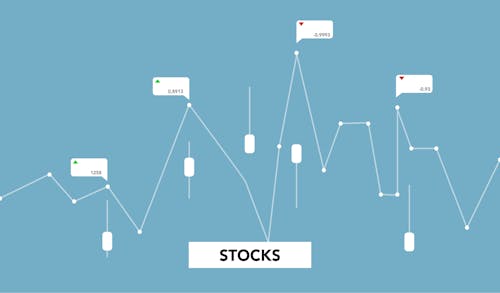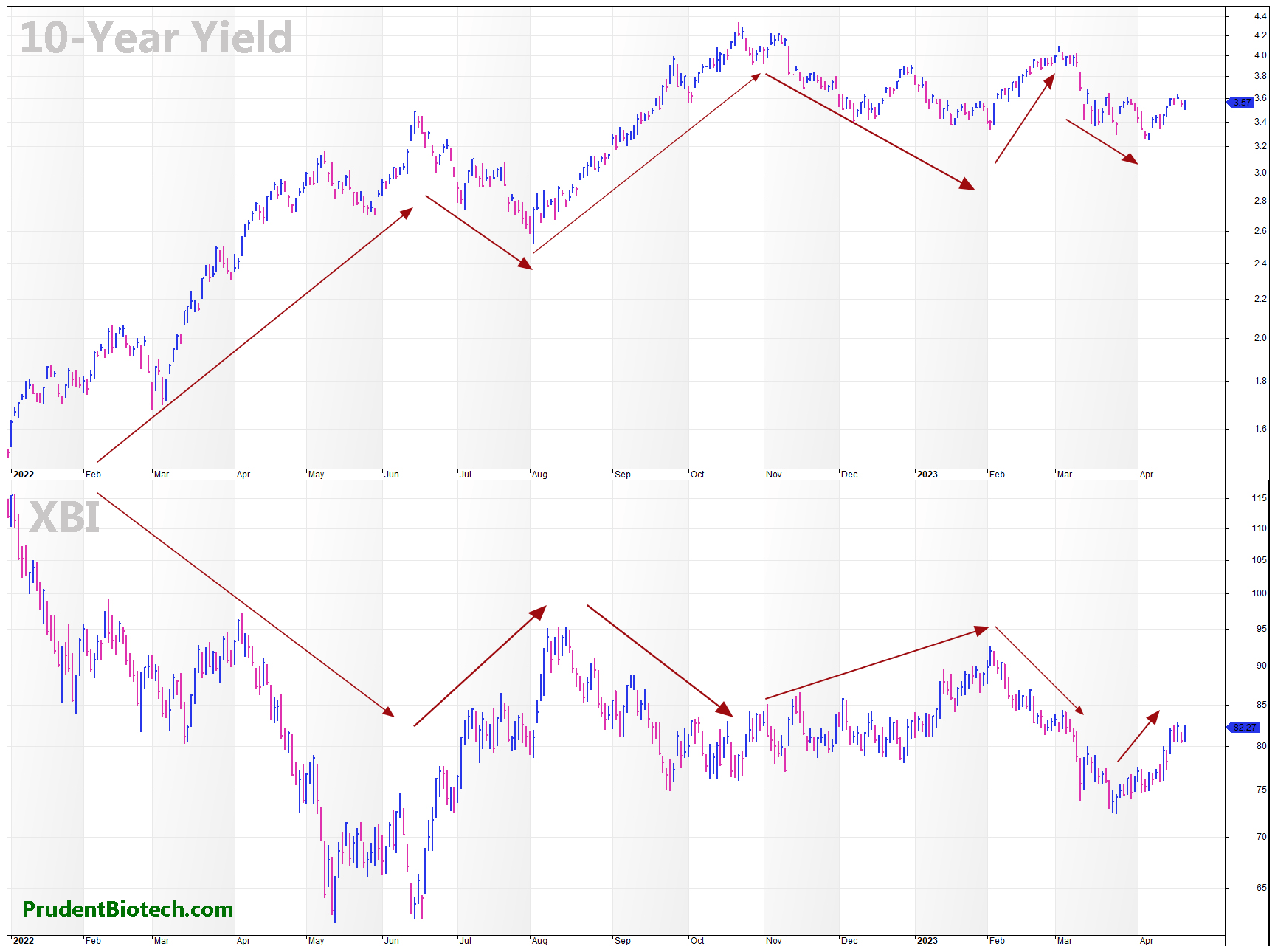Second Quarter Outlook For Biotech Stocks

Image Source: Pexels
Biotech stocks have been consolidating recently but may be ready to rally higher due to factors such as a declining 10-year yield and growing M&A activity.
Biotech deal-making has been increasing, with large acquisitions such as Pfizer's acquisition of Seagen and Merck's acquisition of Prometheus Biosciences.
Biotech valuations remain depressed, but interest in biotechs is growing due to positive trial results and breakthrough treatments.
Biotechs are relatively insulated in a slow or negative growth economic environment due to the defensive nature of drug sales and falling yields.
The stock market's near-term direction will be impacted by forward earnings guidance provided by companies during the ongoing first-quarter earnings season and the upcoming Fed meeting on May 2-3.
Biotech Pulse
After coming under significant pressure in February as the banking crisis unfolded, biotechnology stocks remained under pressure in March as the broader indexes rallied. However, biotechs have started to advance in April, despite a recent uptick in the 10-year yield, as recent acquisitions and favorable trial results are helping buoy the biotech group to its first major advance since late January.
Biotechs Can Move Higher
Investors are weighing the risks of an economic slowdown against the potential benefits of an interest rate pause, leaving stocks at a crossroads. The Federal Reserve may pause rates as soon as their next meeting in May or more likely at the June meeting, but with a positive signal coming out of the next month's meeting.
The Fed's decision to pause will likely be driven by credit tightening resulting from the after-effects of the banking flare-up, providing the Fed with the flexibility to step off the rate hike path, at least for some time. Economic data does not support easing at this time, but a resurgence of the banking crisis may make it a viable option later in the second half of the year.
With 10-year yields anchored for now between 3.5% and 4%, and more likely to fall than rise as the economy slows down, biotech stocks will become attractive due to their high negative correlation to the yield. The direction of the yield over the next three weeks will be important in determining biotech fortunes over the near term.
(Click on image to enlarge)
Acquisitions and Partnerships
Over the past two months, there has been a surge in biotech deal-making. This includes Pfizer's (PFE) acquisition of Seagen (SGEN) in March for over $40 billion, making it one of the largest deals since Bristol-Myers Squibb's (BMY) acquisition of Celgene in 2019. Last week Merck announced its acquisition of Prometheus Biosciences (RXDX) for over $10 billion, and GSK (GSK) announced its $2 billion purchase of BELLUS Health (BLU). More potential deals have been rumored in the financial media, including Aurinia Pharmaceuticals (AUPH), BridgeBio Pharma (BBIO), and Apellis Pharmaceuticals (APLS). This increased M&A activity is in contrast to last year, which saw multi-year lows in biotech transactions.
Biotech valuations remain depressed with the broader S&P biotechnology index (XBI), which comprises smaller biotech companies, still below its 200-day moving average, plunging after the banking crisis unfolded. The Nasdaq Biotechnology Index (IBB), which comprises more larger-cap biotech companies, has fared better.
However, interest in biotechs is growing due to positive trial results and new treatments. Although rising interest rates hurt deal-making, healthcare companies are taking advantage of relatively lower biotech valuations and their cash hoards in pursuing transactions. Growing M&A activity will improve investor sentiment toward the group.
Economic Environment
The risk environment is significantly influenced by the state of the economy. As the probability of a slowdown rises, it increases the risk of an earnings slowdown across corporate America. This will diminish the appetite for risk-taking and impact stock valuations. That is why smaller cap companies, which are more sensitive to fluctuations in economic growth, remain under stress, as evidenced by declining valuations of small cap indexes (IWM), (IJR).
Biotechs are relatively more insulated than the broader market in slow or negative growth economic environments due to their focus on drug development and trials and the defensive nature of drug sales. The declining 10-year yield, which is the typical discount rate used in valuations, in a slowdown environment can favor biotech stocks.
Conclusion
While biotech stocks have been consolidating in recent months, some factors suggest they may be ready to rally higher. In our 2023 Biotech Outlook, we noted that after two consecutive years of negative or barely positive returns, this can be a year of biotechs, particularly as the year matures. While the broader market will have to overcome worries of a potential recession, the biotech group should be able to find support and relatively outperform in that environment.
As the first quarter earnings season picks up momentum this week, the stock market will get its direction near-term from the forward earnings guidance provided by companies. The upcoming Fed meeting on May 2-3 will be pivotal in clarifying when a pause in rate hikes will occur and provide further direction to the stock market.
Biotechs appear to be well-positioned to trend higher during the second quarter, provided there are no yield spikes. A near-term risk that can potentially grow and cause a flight to safety is the inability of Congress to get the debt ceiling legislation passed before the limit is reached in June.
The Prudent Biotech model portfolio remains fully invested at the moment. More companies have started to break out in the group after a lengthy consolidation. A few promising ones, some of which may be part of the Prudent Biotech, Prudent Healthcare, or Prudent Small Cap portfolios, include Gilead Sciences (GILD), Vertex Pharmaceuticals (VRTX), Apellis Pharmaceuticals (APLS), IVERIC bio (ISEE), Intra-Cellular Therapies (ITCI), TG Therapeutics (TGTX), Alkermes (ALKS), Madrigal Pharmaceuticals (MDGL), Akero Therapeutics (AKRO), Viking Therapeutics (VKTX), BridgeBio (BBIO), Verona Pharma (VRNA), Xenon Pharmaceuticals (XENE), Arcellx (ACLX), and Reata Pharmaceuticals (RETA). Biotechnology is a volatile industry group and investors should exercise caution and conduct their research before making any investment decisions.
More By This Author:
The Market Waits
Market’s Biggest Week This Year As The Fed Meets
Biotech Bonanza: 2023 Biotech Outlook As The Fed Remains Hawkish




